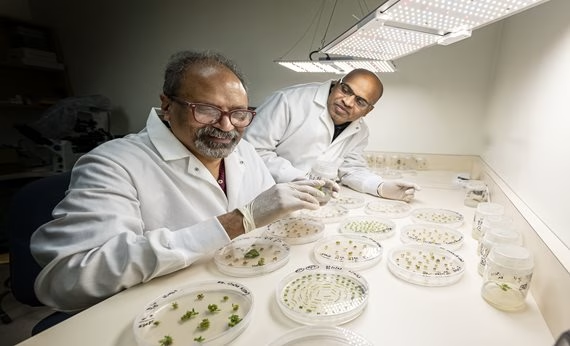Contact: Jack Bailey
(304) 766-4109
jbaile19@wvstateu.edu
FOR IMMEDIATE RELEASE
INSTITUTE, W.Va. – West Virginia State University (WVSU) and West Virginia University (WVU) are making strides in the field of artificial intelligence (AI) by using it to predict genetic modifications on habanero peppers.
Led by project head Dr. Umesh Reddy, WVSU professor of genetics and genomics, the research aims to support the prevention and treatment of genetic diseases in the future. The team is working on an AI program that can predict the effects of certain genetic modifications on organisms and is currently focusing on predicting key attributes of habanero peppers such as size, color and taste.
The project has received a three-year grant from the National Science Foundation for $600,000, with $350,000 for work at WVSU and $250,000 for work at WVU. The study will be conducted using genetically modified habaneros grown in Reddy's WVSU lab to test the predictions of AI models developed at WVU by Donald Adjeroh and Professor Gianfranco Doretto.
The larger focus of this research is Pattern Association Discovery (PAD), which aims to find patterns across "loosely coupled domains" such as genetic code and level of spiciness, which overlap in ways too complex for humans to easily identify.
The researchers are using computational methods to look at the genes that determine the nature of a pepper and are figuring out which genes should be manipulated if a farmer wants to make peppers that are redder or bigger.
The AI methods will predict the response based on the genomic data, and then WVSU will go to the lab to validate that through biological experiments. Finally, the researchers will investigate the relationship between the phenotype and how spicy human taste testers perceive its flavor to be.
Follow West Virginia State University and WVSU Extension Service on Facebook and Twitter @WVStateU.
West Virginia State University is a public, land grant, historically black university, which has evolved into a fully accessible, racially integrated, and multi‐generational institution, located in Institute, W.Va. As a "living laboratory of human relations," the university is a community of students, staff, and faculty committed to academic growth, service and preservation of the racial and cultural diversity of the institution. Its mission is to meet the higher education and economic development needs of the state and region through innovative teaching and applied research.
West Virginia State University is an equal opportunity/affirmative action institution and does not discriminate against any person because of race, color, religion, sex/gender, national origin, ancestry, age, blindness, disability, pregnancy, genetic information, sexual orientation, gender identity, veteran or military status or other category that is protected under federal, state or local anti-discrimination laws as protected characteristics.
